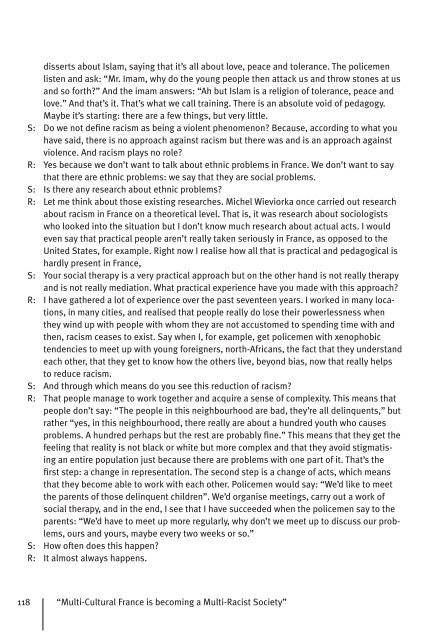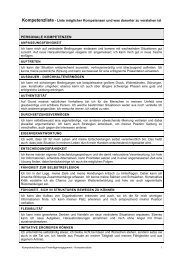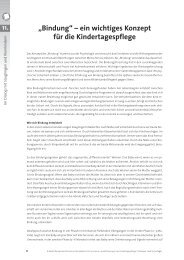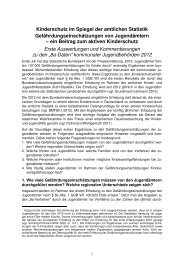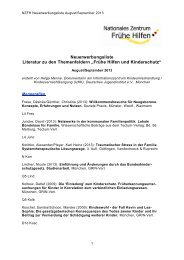Prevention of Right-Wing Extremism, Xenophobia and Racism in ...
Prevention of Right-Wing Extremism, Xenophobia and Racism in ...
Prevention of Right-Wing Extremism, Xenophobia and Racism in ...
You also want an ePaper? Increase the reach of your titles
YUMPU automatically turns print PDFs into web optimized ePapers that Google loves.
disserts about Islam, say<strong>in</strong>g that it’s all about love, peace <strong>and</strong> tolerance. The policemen<br />
listen <strong>and</strong> ask: “Mr. Imam, why do the young people then attack us <strong>and</strong> throw stones at us<br />
<strong>and</strong> so forth?” And the imam answers: “Ah but Islam is a religion <strong>of</strong> tolerance, peace <strong>and</strong><br />
love.” And that’s it. That’s what we call tra<strong>in</strong><strong>in</strong>g. There is an absolute void <strong>of</strong> pedagogy.<br />
Maybe it’s start<strong>in</strong>g: there are a few th<strong>in</strong>gs, but very little.<br />
S: Do we not defi ne racism as be<strong>in</strong>g a violent phenomenon? Because, accord<strong>in</strong>g to what you<br />
have said, there is no approach aga<strong>in</strong>st racism but there was <strong>and</strong> is an approach aga<strong>in</strong>st<br />
violence. And racism plays no role?<br />
R: Yes because because we don’t want to talk about ethnic problems <strong>in</strong> France. We don’t want to say<br />
that there there are ethnic problems: we say that they are social problems.<br />
S: Is there any research about ethnic problems? problems?<br />
R: Let me th<strong>in</strong>k about about those exist<strong>in</strong>g researches. Michel Wieviorka once carried out research<br />
about racism <strong>in</strong> France on a theoretical level. That is, it was research about sociologists<br />
who looked <strong>in</strong>to the situation but but I don’t don’t know much research about actual acts. I would<br />
even say that practical people aren’t really taken seriously <strong>in</strong> France, as opposed to the<br />
United States, for example. <strong>Right</strong> now I realise how all that is practical <strong>and</strong> pedagogical is<br />
hardly present <strong>in</strong> France,<br />
S: Your social therapy is a very practical approach but on the other h<strong>and</strong> is not really therapy<br />
<strong>and</strong> is not really mediation. What practical experience have you made with this approach?<br />
R: I have gathered a lot <strong>of</strong> experience over the past seventeen years. I worked <strong>in</strong> many localoca- tions, <strong>in</strong> many cities, cities, <strong>and</strong> realised that people really do lose their powerlessness when<br />
they w<strong>in</strong>d up with people with whom they are are not accustomed to spend<strong>in</strong>g time with <strong>and</strong><br />
then, racism ceases to exist. Say when I, for example, get policemen with xenophobic<br />
tendencies to meet up with young foreigners, north-Africans, the fact that they underst<strong>and</strong><br />
each other, that they get to know how the others live, beyond bias, now that really helps<br />
to reduce racism.<br />
S: And through which means do you see this reduction <strong>of</strong> racism?<br />
R: That That people manage to work together <strong>and</strong> acquire a sense <strong>of</strong> complexity. This means that<br />
people don’t say: “The people <strong>in</strong> this neighbourhood are bad, they’re all del<strong>in</strong>quents,” but<br />
rather “yes, <strong>in</strong> this neighbourhood, there really are about a hundred youth who causes<br />
problems. A hundred perhaps but the rest are probably fi ne.” This means that they get the<br />
feel<strong>in</strong>g that reality is not black or white but more complex <strong>and</strong> that they avoid stigmatis-<br />
<strong>in</strong>g an entire population just because there are problems with one part <strong>of</strong> it. That’s the<br />
fi rst step: a change <strong>in</strong> representation. The second step is a change <strong>of</strong> acts, which means<br />
that they become able to work with each other. Policemen would say: “We’d like to meet<br />
the parents <strong>of</strong> those del<strong>in</strong>quent children”. We’d organise meet<strong>in</strong>gs, carry out a work <strong>of</strong><br />
social therapy, <strong>and</strong> <strong>in</strong> the end, I see that I have succeeded when the policemen say to the<br />
parents: “We’d have to meet up more regularly, why don’t we meet up to discuss our prob-<br />
lems, ours <strong>and</strong> yours, maybe every two weeks or so.”<br />
S: How <strong>of</strong>ten does this happen?<br />
R: It almost always happens.<br />
118 “Multi-Cultural France is becom<strong>in</strong>g a Multi-Racist Society”


